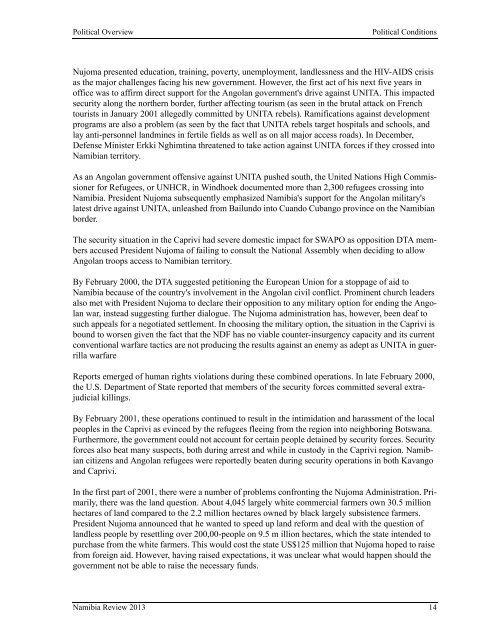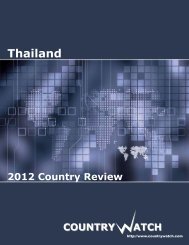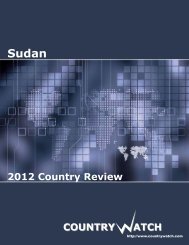Namibia - CountryWatch
Namibia - CountryWatch
Namibia - CountryWatch
You also want an ePaper? Increase the reach of your titles
YUMPU automatically turns print PDFs into web optimized ePapers that Google loves.
Political Overview Political Conditions<br />
Nujoma presented education, training, poverty, unemployment, landlessness and the HIV-AIDS crisis<br />
as the major challenges facing his new government. However, the first act of his next five years in<br />
office was to affirm direct support for the Angolan government's drive against UNITA. This impacted<br />
security along the northern border, further affecting tourism (as seen in the brutal attack on French<br />
tourists in January 2001 allegedly committed by UNITA rebels). Ramifications against development<br />
programs are also a problem (as seen by the fact that UNITA rebels target hospitals and schools, and<br />
lay anti-personnel landmines in fertile fields as well as on all major access roads). In December,<br />
Defense Minister Erkki Nghimtina threatened to take action against UNITA forces if they crossed into<br />
<strong>Namibia</strong>n territory.<br />
As an Angolan government offensive against UNITA pushed south, the United Nations High Commissioner<br />
for Refugees, or UNHCR, in Windhoek documented more than 2,300 refugees crossing into<br />
<strong>Namibia</strong>. President Nujoma subsequently emphasized <strong>Namibia</strong>'s support for the Angolan military's<br />
latest drive against UNITA, unleashed from Bailundo into Cuando Cubango province on the <strong>Namibia</strong>n<br />
border.<br />
The security situation in the Caprivi had severe domestic impact for SWAPO as opposition DTA members<br />
accused President Nujoma of failing to consult the National Assembly when deciding to allow<br />
Angolan troops access to <strong>Namibia</strong>n territory.<br />
By February 2000, the DTA suggested petitioning the European Union for a stoppage of aid to<br />
<strong>Namibia</strong> because of the country's involvement in the Angolan civil conflict. Prominent church leaders<br />
also met with President Nujoma to declare their opposition to any military option for ending the Angolan<br />
war, instead suggesting further dialogue. The Nujoma administration has, however, been deaf to<br />
such appeals for a negotiated settlement. In choosing the military option, the situation in the Caprivi is<br />
bound to worsen given the fact that the NDF has no viable counter-insurgency capacity and its current<br />
conventional warfare tactics are not producing the results against an enemy as adept as UNITA in guerrilla<br />
warfare<br />
Reports emerged of human rights violations during these combined operations. In late February 2000,<br />
the U.S. Department of State reported that members of the security forces committed several extrajudicial<br />
killings.<br />
By February 2001, these operations continued to result in the intimidation and harassment of the local<br />
peoples in the Caprivi as evinced by the refugees fleeing from the region into neighboring Botswana.<br />
Furthermore, the government could not account for certain people detained by security forces. Security<br />
forces also beat many suspects, both during arrest and while in custody in the Caprivi region. <strong>Namibia</strong>n<br />
citizens and Angolan refugees were reportedly beaten during security operations in both Kavango<br />
and Caprivi.<br />
In the first part of 2001, there were a number of problems confronting the Nujoma Administration. Primarily,<br />
there was the land question. About 4,045 largely white commercial farmers own 30.5 million<br />
hectares of land compared to the 2.2 million hectares owned by black largely subsistence farmers.<br />
President Nujoma announced that he wanted to speed up land reform and deal with the question of<br />
landless people by resettling over 200,00-people on 9.5 m illion hectares, which the state intended to<br />
purchase from the white farmers. This would cost the state US$125 million that Nujoma hoped to raise<br />
from foreign aid. However, having raised expectations, it was unclear what would happen should the<br />
government not be able to raise the necessary funds.<br />
<strong>Namibia</strong> Review 2013 14




